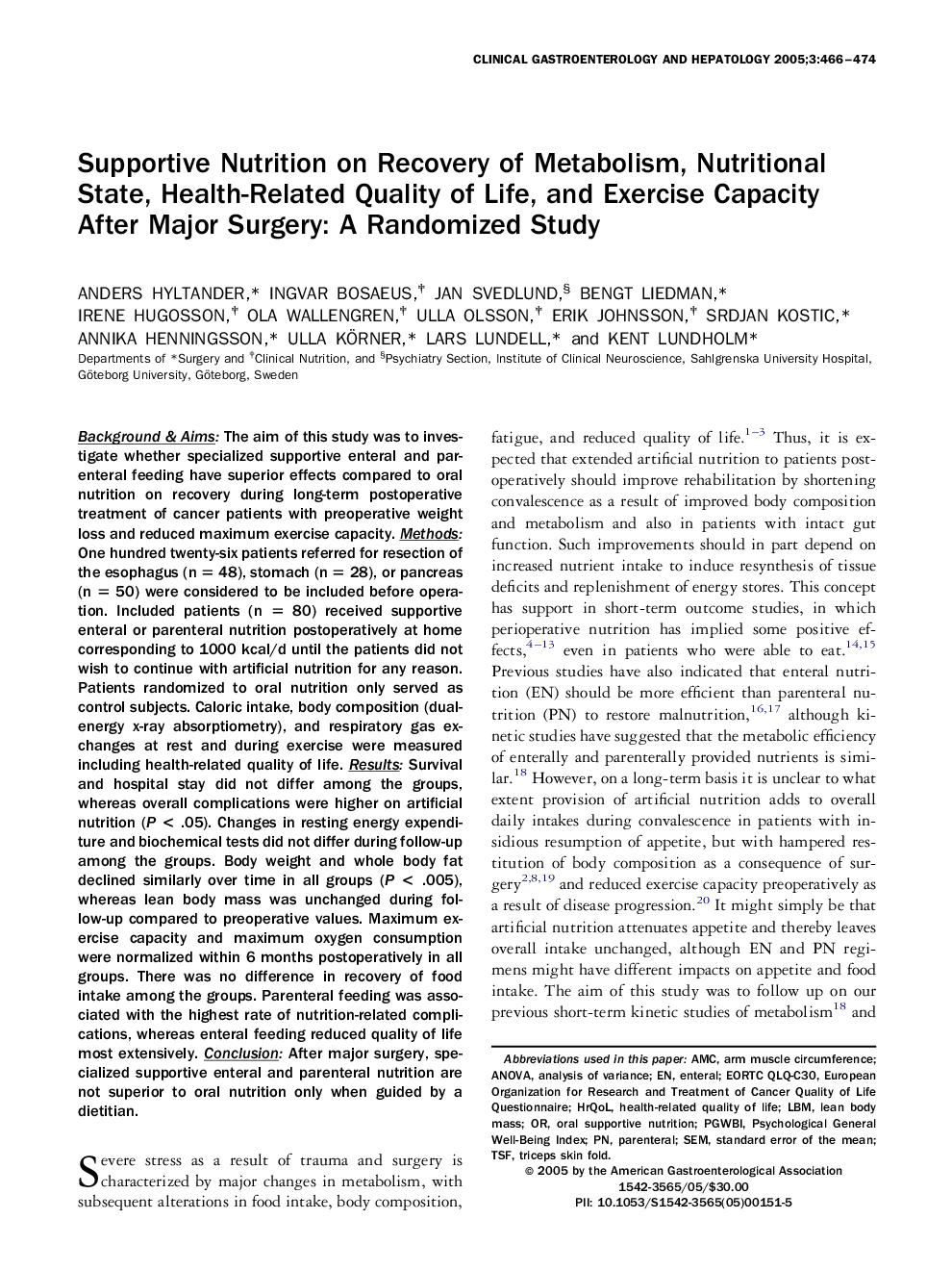| کد مقاله | کد نشریه | سال انتشار | مقاله انگلیسی | نسخه تمام متن |
|---|---|---|---|---|
| 9241762 | 1209244 | 2005 | 9 صفحه PDF | دانلود رایگان |
عنوان انگلیسی مقاله ISI
Supportive Nutrition on Recovery of Metabolism, Nutritional State, Health-Related Quality of Life, and Exercise Capacity After Major Surgery: A Randomized Study
دانلود مقاله + سفارش ترجمه
دانلود مقاله ISI انگلیسی
رایگان برای ایرانیان
کلمات کلیدی
LBMAmCHRQOLEORTC QLQ-C30European Organization for Research and Treatment of Cancer Quality of Life QuestionnaireTSFEnteral - انتالالanalysis of variance - تحلیل واریانسANOVA - تحلیل واریانس Analysis of varianceParenteral - تزریقیLean body mass - توده بدون چربی بدنstandard error of the mean - خطای استاندارد میانگینSEM - مدل معادلات ساختاری / میکروسکوپ الکترونی روبشیHealth-related quality of life - کیفیت زندگی مرتبط با سلامت
موضوعات مرتبط
علوم پزشکی و سلامت
پزشکی و دندانپزشکی
بیماریهای گوارشی
پیش نمایش صفحه اول مقاله

چکیده انگلیسی
Background & Aims: The aim of this study was to investigate whether specialized supportive enteral and parenteral feeding have superior effects compared to oral nutrition on recovery during long-term postoperative treatment of cancer patients with preoperative weight loss and reduced maximum exercise capacity. Methods: One hundred twenty-six patients referred for resection of the esophagus (n = 48), stomach (n = 28), or pancreas (n = 50) were considered to be included before operation. Included patients (n = 80) received supportive enteral or parenteral nutrition postoperatively at home corresponding to 1000 kcal/d until the patients did not wish to continue with artificial nutrition for any reason. Patients randomized to oral nutrition only served as control subjects. Caloric intake, body composition (dual-energy x-ray absorptiometry), and respiratory gas exchanges at rest and during exercise were measured including health-related quality of life. Results: Survival and hospital stay did not differ among the groups, whereas overall complications were higher on artificial nutrition (P < .05). Changes in resting energy expenditure and biochemical tests did not differ during follow-up among the groups. Body weight and whole body fat declined similarly over time in all groups (P < .005), whereas lean body mass was unchanged during follow-up compared to preoperative values. Maximum exercise capacity and maximum oxygen consumption were normalized within 6 months postoperatively in all groups. There was no difference in recovery of food intake among the groups. Parenteral feeding was associated with the highest rate of nutrition-related complications, whereas enteral feeding reduced quality of life most extensively. Conclusion: After major surgery, specialized supportive enteral and parenteral nutrition are not superior to oral nutrition only when guided by a dietitian.
ناشر
Database: Elsevier - ScienceDirect (ساینس دایرکت)
Journal: Clinical Gastroenterology and Hepatology - Volume 3, Issue 5, May 2005, Pages 466-474
Journal: Clinical Gastroenterology and Hepatology - Volume 3, Issue 5, May 2005, Pages 466-474
نویسندگان
Anders Hyltander, Ingvar Bosaeus, Jan Svedlund, Bengt Liedman, Irene Hugosson, Ola Wallengren, Ulla Olsson, Erik Johnsson, Srdjan Kostic, Annika Henningsson, Ulla Körner, Lars Lundell, Kent Lundholm,